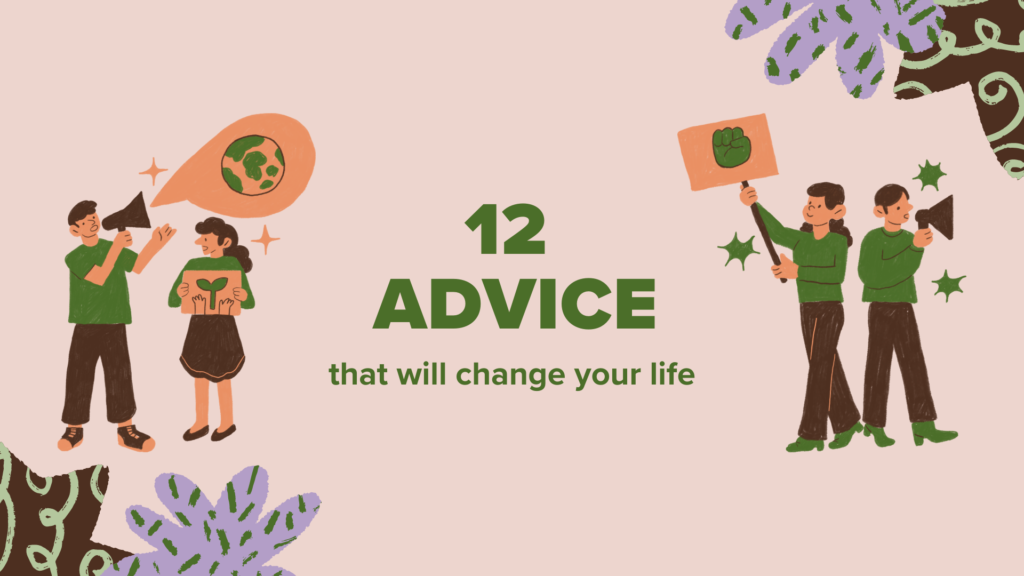Last updated on June 13th, 2024 at 06:25 am

12 Advice That Will Change Your Life | Start Doing These 12 Things Today
Do you know why people love to give advice? I am not 100% sure why people give advice; it may vary. You may say they give advice just to help other people. But there are some who give advice to show expertise and capability. Ultimately, the goal of giving advice is to help others. However, giving advice can be tricky because you don’t know for sure whether the advice will benefit them or not. I sit in the middle of this scenario. I want to help, and I am not an expert. So, the 12 pieces of advice I am going to share with you are things I learned from various experiences and am still trying to implement in my life. This advice helped me one way or another, and I hope it will help you too.
Focus on Improving Your Knowledge
It is so important to continuously improve your knowledge. I know you can’t learn everything on this planet, but try to improve your knowledge on how the banking system works, how taxation works, how the global economy works, and how the stock market works. Try to have knowledge of things that may have a direct or indirect effect on your life. In most cases, people will try to manipulate you in these areas. Having enough knowledge will help you avoid being manipulated and help you understand things better so that you can make better decisions.
Early Investment
Warren Buffett and Charlie Munger, two of the greatest names in finance and investment, said, “The earlier you invest, the sooner you will become a millionaire.” So, if you invest early, there is a high chance of you becoming a millionaire. A person who invests regularly in their 20s has a much higher chance of becoming a millionaire than someone who invests in their 30s or 40s. This is the true power of compound interest. Check out this simple calculation from FLAGSTONE:
Compound interest helps your money grow faster. It’s like a snowball effect – your savings increase, and so does the interest you earn. This continuous cycle can increase your savings more quickly than simple interest.
Let’s break down how compound interest works with a practical example:
Initial deposit: You start with a £5,000 deposit into a savings account.
Annual interest rate: The account offers a 5% (0.05) annual interest rate.
Year 1:
Interest earned in the first year: £5,000 x 0.05 = £250
Total savings after the first year: £5,000 + £250 = £5,250
Year 2:
Interest earned in the second year: £5,250 x 0.05 = £262.50
Total savings after the second year: £5,250 + £262.50 = £5,512.50
This continuous cycle of earning interest on both the initial deposit and the accumulated interest from previous periods is what makes compound interest a powerful tool for growing your savings over time.
Bachelor and Master’s Degrees Don’t Give You Leverage
Now, having a bachelor’s and master’s degree doesn’t give you any upper hand. First, let’s look at the survey done by Pew Research Center:
- Only one in four U.S. adults say it’s extremely or very important to have a four-year college degree to get a well-paying job in today’s economy. About a third (35%) say a college degree is somewhat important, while 40% say it’s not too or not at all important
- Roughly half (49%) say it’s less important to have a four-year college degree today to get a well-paying job than it was 20 years ago; 32% say it’s more important, and 17% say it’s about as important as it was 20 years ago.
- Only 22% say the cost of getting a four-year college degree today is worth it even if someone has to take out loans. Some 47% say the cost is worth it only if someone doesn’t have to take out loans. And 29% say the cost is not worth it.
From the research, we can see that some people say having a bachelor’s or master’s degree isn’t giving you much leverage in this day and age. Also, some people say it is as important to have a degree. This looks gray. So what should we do? Getting a degree is absolutely your own decision; you can decide whether you want it or not. But one thing is you need to have a high-value skill and some soft skills to build your career.
Don’t Buy Anything Fancy
Most of us buy expensive things just for signaling purposes. Like buying a wallet from Louis Vuitton or Gucci to show our friends and colleagues our taste or status. This kind of approach in life is dangerous; it will lead you to a stage where you feel unsatisfied with everything. Luxury has no end, and as a result, you will have an extreme void in life.
So, will you never buy anything expensive? You will. If you have a desire to travel the world and capture those moments for which you decided to buy an iPhone, then go for it. If you want to have a PlayStation to enjoy some gaming for mental peace, then go for it. If you need any expensive thing, you can go for it, but remember, don’t buy it just to show off!
Avoid Goals
Goals are useless. They don’t bring any benefits to you at all. I have set a lot of goals in life, but they brought too little change. The thing that worked for me is habit-changing. Let’s say you want to lose weight; setting that goal actually doesn’t mean anything. You will not lose weight by just saying that. But you will start to see little results if you do 10 push-ups every day and gradually increase it, eventually making it a habit. So it is not like a goal that you write on sticky notes and hang on a wall. Rather, you decide to do 10 push-ups and immediately do them.
So I am saying, set goals and immediately forget about them. Instead, focus on the little things you can change to achieve that goal.
Advice Fallacy
You may wonder what is an advice fallacy. Advice fallacy means when you seek someone’s advice, they usually try to give you unique advice that you may never have heard of. In most cases, we need normal advice. When someone is giving us advice, they will think in their mind they need to come up with something that others haven’t heard before. As a result, the advice will be something so unique that it will be of little or less effective. Keep in mind that when you are seeking advice from someone, that person will give you advice just to make themselves look smart or superior. Most people will give advice just to satisfy themselves, so beware of it!
Build Connections Using Value
Connections and relationships are your most important assets. Your most important asset isn’t your house, computer, or anything else but who you know and who knows you, and how good your relationship with them is. This is undoubtedly your most precious asset. So the important question is, how will you build a connection or relationship? Your first task is to provide value! Value can be anything, maybe giving some suggestions or helping them meet other people, or doing some work for them, or providing your skill to them. The quality of your value will determine how good your connections are.
Start Journaling
Take a notebook and start journaling. The core value of journaling is that it makes your thinking structured. When we start to think about something, we can’t properly focus on that topic because other thoughts come to mind. To be specifically mindful about that thought, write it in your notebook so that you can see it frequently. At first, it will be tough; you will not understand what to write or how to write, but eventually, you will figure out how to journal your thoughts. One simple tip is to just write a few words about that thought. After that, it will become a habit for you, and you will have no problem journaling anything. So just try it out now!
Start Traveling
Start traveling and being independent. When you start to travel, you have to do a lot of things on your own. Doing many things on your own can make you hugely responsible. Also, traveling can broaden your horizons. When you travel to different places and countries, you see big differences in people, culture, food, and vibe. All these differences expand your perspective, and you start to observe everything in a bigger scenario. Travel is expensive; you need money, time, a visa, and other factors need to align in order to travel. So start small.
Read
Read. That’s it! We have to read a lot, and there is no end to it. Read whatever you like. You can read fiction like Harry Potter or Lord of the Rings, or you can read non-fiction like 4-Hour Workweek or Tools of Titans. No matter what kind of books you read, it will only benefit you. How reading books influences your imagination, style of talking, and structuring thoughts—nothing else can do that. That’s why reading books is highly recommended.
Gratitude is a Practiced Skill
Most of us are not as grateful as we should be. Gratitude helps us understand how lucky we are to be born as humans. This realization is needed to stay grounded in life. Yes, it is good to be ambitious and have big dreams, but it is equally important to be grounded. You need to be grateful for having fresh water, electricity, food, and clothes because many people don’t have these things. So I am trying to be as grateful as possible and I want everyone to be grateful. Every night before going to sleep, I try my best to show gratitude for everything that I have.
Start a Business Before You Are 30
I am 24 now and I have tried two businesses and failed in both. Now I am trying my luck with this blogging business. Not sure whether it will be successful or not. But one positive thing is that I have too little responsibility in life. I am not married yet and my parents are good on their own. I don’t have to worry about it, so I can take risks without hurting anybody. But I am not sure what will happen in the future and what kind of responsibilities I will have. So it is best to try some businesses or do some risky things before you’re 30 because after 30, it will not only affect you but your surroundings as well.
These are the 12 pieces of advice I learned from various experiences, and they helped me make better decisions. I gave all this advice while bearing the advice fallacy theory in mind. So don’t panic, I tried to be authentic and relatable so that all this advice helps you through your life journey.


